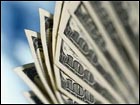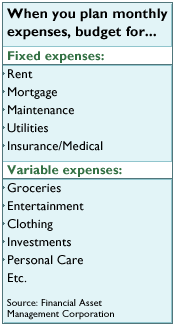
NEW YORK (CNN/Money) -
Just a few years ago, people scoffed at advice to set aside emergency funds. Stocks boasting double-digit annual returns made your typical emergency fund – enough for a few months' expenses, kept liquid – seem like a waste.
But the heady feeling that Wall Street could do no wrong has ground to a halt. Portfolios are down and unemployment is up. Widespread layoffs, the threat of terrorism, and the demise of Enron remind us of the potential for unforeseen adversity. And emergency funds are coming back into fashion.
Planners usually say you should stash enough to cover 3 to 6 months' living expenses. You're probably safe on the lower end of that scale if you have a stable job and no dependents. (You might want to shoot for more, however, if you've got your own business and six kids.)
Savings vehicles come in every flavor: planners usually suggest a money market account, savings account, or money market mutual fund for emergency dollars, which have relatively low yields, but high liquidity. If you have more than 6 months' cash, they recommend you expand into certificates of deposit (CDs) and ultra-short bond funds, which offer a better yield, though slightly less liquidity.
A mix of investment instruments, however, sometimes works best. Consider these:
Money market accounts -- These come in two varieties -- money market bank accounts and money market mutual funds. Today, the average money market bank account pays 1.07 percent, according to Bankrate. The average taxable money market mutual fund pays 1.38 percent, according to IMoneyNet.
To find the best rates on money market accounts, click here. Typically, there is a premium paid on money market accounts over savings accounts -- because they're considered less transaction-oriented. You may be limited to only a few free checks each month, for example.
Mutual fund families offer money market mutual funds, which usually pay a bit more, but aren't insured by the Feds. (All bank deposits are FDIC insured, meaning the U.S. government has you covered up to $100,000 in case the bank fails. However, money market funds are widely considered as stable as money market bank accounts – Vanguard isn't likely to shut down tomorrow and make off with your emergency fund.)
"A money market account with check-writing privileges lets you get the money quickly," said Scott Kahan, a certified financial planner in New York City. "It's a good short-term savings vehicle, with no volatility at all, and you have immediate access."
Bank savings accounts -- In today's weak interest rate environment, you'll probably get a similar return on a savings account -- averaging about 1.14 percent, according to Bankrate -- as you would on a money market account.
Phil Cook, a certified financial planner in Torrance, Calif., said savings accounts from virtual or online banks are a better deal than accounts from brick-and-mortar banks.

"Many virtual banks and credit unions offer liquid savings accounts paying around 3 percent," Cook said. "ING Direct is one; its Orange Savings Account pays 3 percent and links to your checking account."
Brokerage accounts -- These work well for folks who want to save a set amount each year, or want to put aside money for short-term savings goals: holiday gifts, one-time purchases, property taxes and so forth, said Scott Leonard, a certified financial planner in El Segundo, Calif.
Brokerage accounts also work for someone who wants a short-term savings account to perform double duties.
"A discount brokerage account pays a slightly better interest rate than a bank account," Leonard said. "But the good news is that you can take any surplus savings and easily invest. It can be a savings account as well as an investment account."
Short-term CDs -- Certificates of deposit get mixed reviews as repositories for emergency funds, chiefly because they are not as liquid as money market or savings accounts.
A CD guarantees an interest rate for a set period – 3 months, 6 months and so on – but you can't withdraw the money until the term is up. Cash out early, and you pay a penalty, typically a forfeiture of some or all the interest you've earned. How much you forfeit varies -- by institution and by the length of the CD's term, said Greg McBride, a financial analyst at Bankrate.
It's rarely a good idea to invest in a CD if you know you're going to cash out early. Typically, you won't be left with much of what you made in interest after you pay the penalty, McBride said.
However, CDs are a good place to keep "extra" emergency money – if you've covered the bare minimum in a more liquid instrument, you can afford to get a bit of a return on any surplus.
A 3-month CD today pays 1.62 percent on average, according to Bankrate, and its 6-month cousin pays about 1.84 percent. Historically, however, rates for 3-month CDs have gone as high as 4.6 percent, in 2000.
Ultra-short bond funds -- These mutual funds keep your assets stable by investing in short-term, high-grade bonds. Turner Ultra Short Duration Fixed Income Fund, for example, which returned 4.4 percent over the past year, invests in bonds issued by the United States government and high-grade, short-term mortgage securities.
Like CDs, ultra-short funds work well for secondary emergency savings.
Withdrawing from an ultra-short fund is like withdrawing from any mutual fund, said Melanie Woloz, a certified financial planner in Los Angeles. You would request the amount and get the money sent to you within two weeks.
"I'd start with a money market account, but once you have the basic 3 to 6 months saved up, the extra could go in a secondary emergency fund, an ultra-short fund," said Woloz. "They're stable, and you can get a little bit of return on your money."
A word about Roth IRAs -- Unmatchable tax advantages may tempt you to think about saving your emergency money in a Roth IRA. It's not a bad idea to stash some additional emergency cash in a Roth -- after all, you've heard that contributions can be withdrawn tax-free and without penalty at any age. And if that rainy day never comes, your money could just earn away without taxes dragging it down.
But look before you leap. The account must have been open for at least 5 years before you're exempt from penalties when you withdraw any earnings, unless you use them for qualified higher education expenses -- though, in that case, you still pay income taxes on those earnings.
There are other restrictions as well. Under IRS rules, earnings can be withdrawn penalty-free only for specific purposes, like the purchase of your first home.
Plus, the account may be performing poorly when you need it most. It's tough to tap a fund that's posting 20 percent losses.
"If your Roth money is invested in equities, you have no liquidity," said Kahan.
Cook said he, too, believes Roths are best left to those who are in it for the long haul.
"I don't think a Roth is a good emergency savings vehicle for your mindset," he said. "If you put money in a retirement account, put in what you can afford to forget about for a while. If you take it out, it's not retirement money anymore. It's just another account."

|

